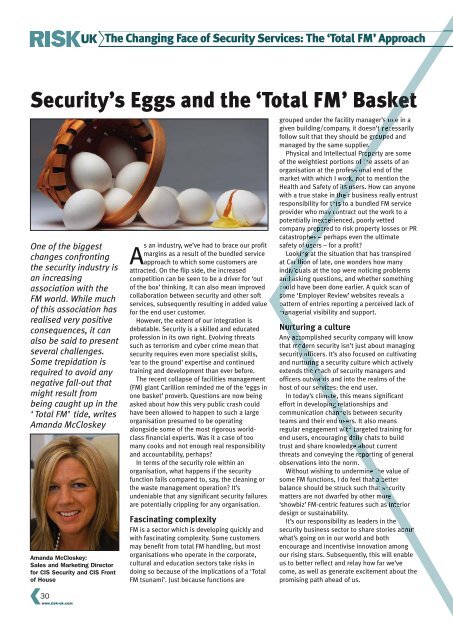RiskUKMarch2018
Create successful ePaper yourself
Turn your PDF publications into a flip-book with our unique Google optimized e-Paper software.
The Changing Face of Security Services: The ‘Total FM’ Approach<br />
Security’s Eggs and the ‘Total FM’ Basket<br />
One of the biggest<br />
changes confronting<br />
the security industry is<br />
an increasing<br />
association with the<br />
FM world. While much<br />
of this association has<br />
realised very positive<br />
consequences, it can<br />
also be said to present<br />
several challenges.<br />
Some trepidation is<br />
required to avoid any<br />
negative fall-out that<br />
might result from<br />
being caught up in the<br />
‘Total FM’ tide, writes<br />
Amanda McCloskey<br />
Amanda McCloskey:<br />
Sales and Marketing Director<br />
for CIS Security and CIS Front<br />
of House<br />
30<br />
www.risk-uk.com<br />
As an industry, we’ve had to brace our profit<br />
margins as a result of the bundled service<br />
approach to which some customers are<br />
attracted. On the flip side, the increased<br />
competition can be seen to be a driver for ‘out<br />
of the box’ thinking. It can also mean improved<br />
collaboration between security and other soft<br />
services, subsequently resulting in added value<br />
for the end user customer.<br />
However, the extent of our integration is<br />
debatable. Security is a skilled and educated<br />
profession in its own right. Evolving threats<br />
such as terrorism and cyber crime mean that<br />
security requires even more specialist skills,<br />
‘ear to the ground’ expertise and continued<br />
training and development than ever before.<br />
The recent collapse of facilities management<br />
(FM) giant Carillion reminded me of the ‘eggs in<br />
one basket’ proverb. Questions are now being<br />
asked about how this very public crash could<br />
have been allowed to happen to such a large<br />
organisation presumed to be operating<br />
alongside some of the most rigorous worldclass<br />
financial experts. Was it a case of too<br />
many cooks and not enough real responsibility<br />
and accountability, perhaps?<br />
In terms of the security role within an<br />
organisation, what happens if the security<br />
function fails compared to, say, the cleaning or<br />
the waste management operation? It’s<br />
undeniable that any significant security failures<br />
are potentially crippling for any organisation.<br />
Fascinating complexity<br />
FM is a sector which is developing quickly and<br />
with fascinating complexity. Some customers<br />
may benefit from total FM handling, but most<br />
organisations who operate in the corporate,<br />
cultural and education sectors take risks in<br />
doing so because of the implications of a ‘Total<br />
FM tsunami’. Just because functions are<br />
grouped under the facility manager’s role in a<br />
given building/company, it doesn’t necessarily<br />
follow suit that they should be grouped and<br />
managed by the same supplier.<br />
Physical and Intellectual Property are some<br />
of the weightiest portions of the assets of an<br />
organisation at the professional end of the<br />
market with which I work, not to mention the<br />
Health and Safety of its users. How can anyone<br />
with a true stake in their business really entrust<br />
responsibility for this to a bundled FM service<br />
provider who may contract out the work to a<br />
potentially inexperienced, poorly vetted<br />
company prepared to risk property losses or PR<br />
catastrophes – perhaps even the ultimate<br />
safety of users – for a profit?<br />
Looking at the situation that has transpired<br />
at Carillion of late, one wonders how many<br />
individuals at the top were noticing problems<br />
and asking questions, and whether something<br />
could have been done earlier. A quick scan of<br />
some ‘Employer Review’ websites reveals a<br />
pattern of entries reporting a perceived lack of<br />
managerial visibility and support.<br />
Nurturing a culture<br />
Any accomplished security company will know<br />
that modern security isn’t just about managing<br />
security officers. It’s also focused on cultivating<br />
and nurturing a security culture which actively<br />
extends the reach of security managers and<br />
officers outwards and into the realms of the<br />
host of our services: the end user.<br />
In today’s climate, this means significant<br />
effort in developing relationships and<br />
communication channels between security<br />
teams and their end users. It also means<br />
regular engagement with targeted training for<br />
end users, encouraging daily chats to build<br />
trust and share knowledge about current<br />
threats and conveying the reporting of general<br />
observations into the norm.<br />
Without wishing to undermine the value of<br />
some FM functions, I do feel that a better<br />
balance should be struck such that security<br />
matters are not dwarfed by other more<br />
‘showbiz’ FM-centric features such as interior<br />
design or sustainability.<br />
It’s our responsibility as leaders in the<br />
security business sector to share stories about<br />
what’s going on in our world and both<br />
encourage and incentivise innovation among<br />
our rising stars. Subsequently, this will enable<br />
us to better reflect and relay how far we’ve<br />
come, as well as generate excitement about the<br />
promising path ahead of us.

















